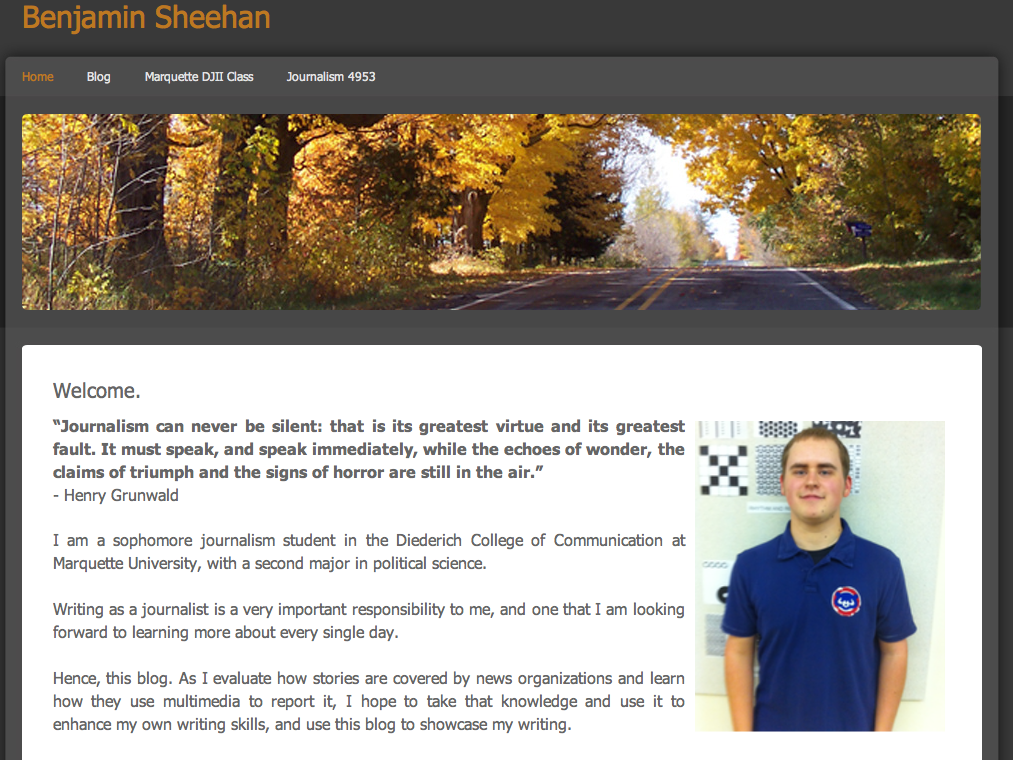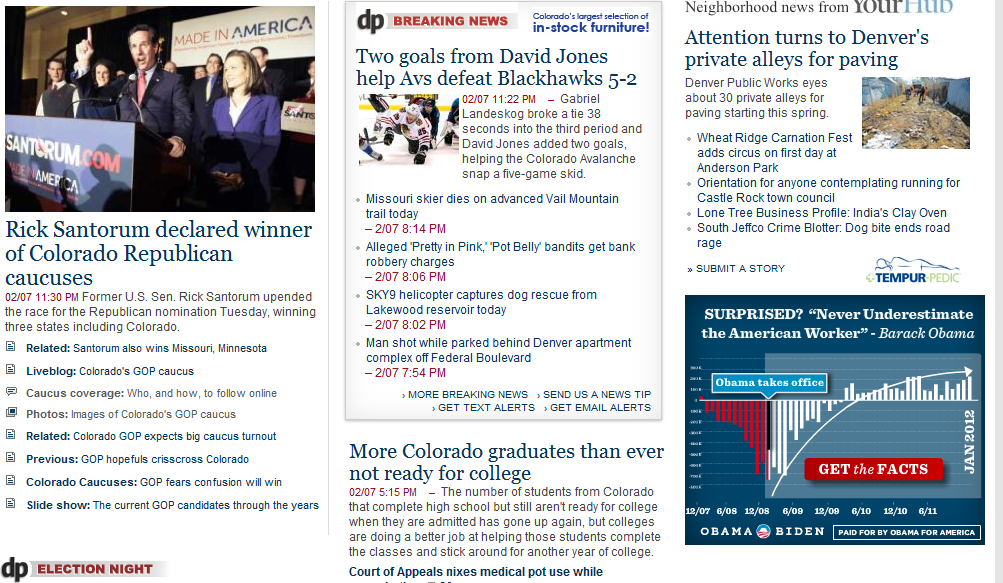The GOP presidential candidates took part in another debate last night, and the Denver Post's coverage was very plain. Other than a photo slideshow, the Post had just one article covering the debate, and it was not very prominent on the homepage.
The homepage includes a politics tab, but the stories being shown on the homepage all had to deal with local political issues. In order to find coverage of the debate, a person would have to click the politics tab and and go the the Post's politics page to find any articles.
During the Colorado primary, the Denver Post did do an exceptional job of providing up to the minute coverage on what was going on that night, including live blogging, constantly updated articles, and, of course, photos.
The one area of the Denver Post's coverage that has continued to impress me is its photography. For every primary and debate, the Post has created a photo slideshow highlighting the night's events and the what the candidates were doing. These slideshows include many behind-the-scenes photos that provide an interesting and new look at the race for the GOP presidential nomination.

Sharif Durhams, the Social Media Editor at the Milwaukee Journal Sentinel, visted our Seminar in Journalism class today and shared how the Journal Sentinel uses social media.
"Our job is to figure out how people are taking in info, and how to deliver it to them in that form," said Durhams.
Durhams shared a video with us of Herman Cain speaking to the Journal Sentinel's editorial board that received over one million Youtube hits after it was tweeted through the Journal Sentinel's Twitter account, @NewsHub. It would not have been as popular if it had merely been written about in the paper.
Social media also allows for transparency from reporters, Durhams said. Reporters can tweet or blog of post on Facebook updates on their progress and the reporting process. They can share how they found their story, and how they reached the conclusions they did in their story.
Our professor, James Scotton, asked Durhams how journalists can distinguish themselves in this shrinking field. Durhams gave two suggestions: to provide in-depth journalism and to be an entrepreneur. What can you do that is uniqe? Durhams said in-depth journalism is still very valuabe, and it is important that our class of young journalists keeps the value of journalism that we learn at Marquette. It is also important to figure out how you can use Facebook and Twitter, and whatever else comes along, to get your material out there.
In our journalism elections seminar class on Tuesday, our professor asked if Mitt Romney was now the "presumptive candidate," i.e. that for all intents and purposes, he was the GOP candidate. When he asked that question, my first thought was that yes, he was the presumptive candidate. But then the Tuesday primaries and caucuses happended.
Rick Santorum had a clean sweep in Missouri, Minnesota and Colorado, home of the Denver Post. Coverage of the Colorado caucuses was front and center on the Denver Post wesbite for the entire day, providing up to the minute results, including a live blog by Post staff.
Besides the traditional articles stating that Santorum had won, the Post also included several photo slideshows, one of the GOP caucus and the other of the GOP candidates through the years. The Denver Post has continued to impress me with its photojournalism, as many of the top headlines are accompanied not just by written articles but also by photo slideshows.
These results definitely make the race for GOP presidential candidate more interesting. Money will start to roll in for Rick Santorum, and his prediction that he is now the main challenger to Mitt Romney is beginning to come true.
Mitt Romney won the Florida primaries convincingly Tuesday, adding 50 delegates to his total count. He still needs over 1,000 additional delegates to secure the GOP nomination for president.
The Post mostly used AP stories in its coverage of the primary results, although one of these AP stories was a photo slideshow that provided great behind-the-scenes looks at the primary. The Denver Post also covered the fact that Ron Paul and Rick Santorum had immediately moved out West to focus on the next several primaries in Nevada and Colorado. So the Denver Post's coverage of the primaries would expectedly pick up in the next week as it prepare's for its own state's primary.Romney moved back to focusing on the president during his victory speech, sounding confident once again that the nomination would be his. I was suprised by Rick Santorum's rather upbeat outlook on the results, saying that Gingrich's loss meant that the main competitor's spot to Romney was once again prime for the taking, and that he would be the candidate to do it.
In our elections class last week, we discussed how great news will be different, covering different aspects of events that other news outlets are not reporting. The Denver Post definitely did not do that with the Florida primaries, although this did not come as a suprise to me as the Florida primaries was probably not important enough to the people of Colorado for the paper to send its own reporters out to do in-depth coverage.





 RSS Feed
RSS Feed